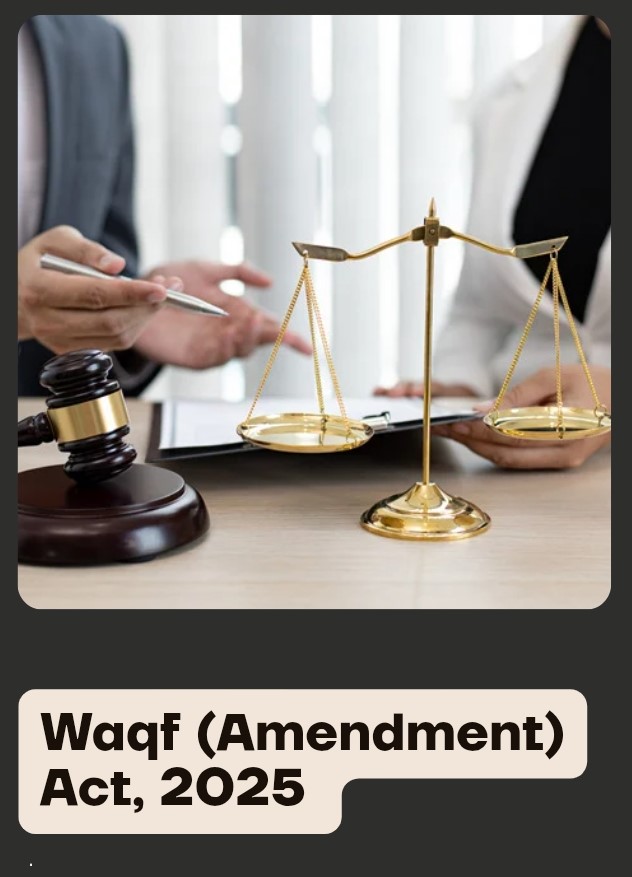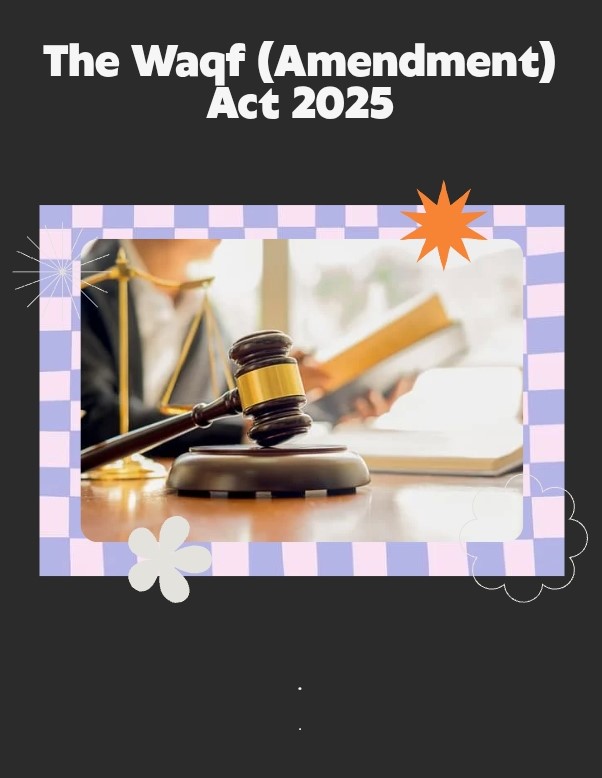
The Waqf (Amendment ) Act 2025
Table of Contents
Introduction
The Waqf (Amendment) Act, 2025 intends to revise the Waqf Act, 1995 to address issues in managing Waqf properties. The changes aim to: fix problems from the old act, improve Waqf boards’ efficiency, update waqf definitions, enhance the registration process, and use technology better for managing Waqf records. The Mussalman Wakf (Repeal) Bill, 2025 plans to abolish the outdated Mussalman Wakf Act, 1923, which is not suitable for today’s India. This repeal will: create consistent rules for managing Waqf properties under the Waqf Act, 1995, boost transparency and accountability in Waqf management, and remove confusion and legal issues from the old law.

History
The history of Waqf in India dates back to the early Delhi Sultanate when Sultan Muizuddin Sam Ghaor dedicated two villages to the Jama Masjid of Multan and appointed Shaikhul Islam to manage them. As the Delhi Sultanate and later Islamic dynasties grew, more Waqf properties were established in India. In the late 19th Century, there was a push to abolish Waqfs due to a legal dispute that reached the Privy Council in London during British rule. The four British judges called Waqf ‘a perpetuity of the worst kind’ and ruled it invalid. However, this ruling was not accepted in India.
• Waqf properties in India are governed by various laws to enhance management and avoid misuse.
• The Mussalman Wakf Validating Act of 1913 allowed Muslims to establish Waqfs for family use, which later supported charitable activities.
• This act aimed to improve Waqf management but had limited success.
• The Mussalman Wakf Act of 1923 set guidelines for better accounting and transparency in Waqf operations.
• The Mussalman Wakf Validating Act of 1930 reinforced the legal status of family Waqfs, providing support to the 1913 Act.
The Waqf Act of 1954 has significantly enhanced the status of Waqf since independence. This legislation facilitated the centralization of Waqfs, leading to the establishment of the Central Waqf Council of India in 1964 by the Government of India. This statutory body is responsible for supervising the activities of various state Waqf boards, which were created in accordance with Section 9(1) of the Waqf Act, 1954.
The Waqf Act of 1995 was designed to be more advantageous for Muslims, establishing it as a primary law. This legislation regulates the management of Waqf Properties (Religious Endowments) in India, detailing the roles and responsibilities of the Waqf Council, State Waqf Boards, and the Chief Executive Officer, as well as the obligations of the mutawalli. Additionally, it outlines the authority and limitations of a Waqf Tribunal, which functions similarly to a civil court within its jurisdiction. Waqf Tribunals are recognized as civil courts and are mandated to exercise all powers and functions ascribed to civil courts under the Code of Civil Procedure, 1908. The rulings of a Tribunal are conclusive and binding on the involved parties, with no recourse to civil court litigation, thereby positioning Waqf Tribunal decisions above those of any civil court. Amendments made in 2013 aimed to enhance the efficiency and transparency of waqf management, but it was observed that the Act fell short in effectively improving Waqf administration. The Waqf Repeal Bill, introduced in the Rajya Sabha on December 8, 2023, seeks to establish a fairer framework for the treatment of waqf and other similar religious entities.
Key features of Waqf (Amendment) Act 2025
- The Waqf Act of 1995 has been renamed to the Unified Waqf Management, Empowerment, Efficiency, and Development Act, 1995, to better show its goal of enhancing the management and efficiency of Waqf boards and properties, focusing on empowerment, development, and effective administration.
- Creating a Waqf: The Act allows for waqf to be established through: (i) a declaration, (ii) acknowledgment based on long-term use (waqf by user), or (iii) an endowment when the line of succession ends (waqf-alal-aulad). The Bill specifies that only someone who has practiced Islam for at least five years can declare a waqf and must own the property in question. It eliminates waqf by user, which allowed properties to be classified as waqf based only on extended use for religious purposes. Additionally, it states that waqf-alal-aulad should not infringe on the inheritance rights of the donor’s heirs, including women.
- Government property as Waqf: The Bill says that any government property marked as waqf will no longer be considered as such. The local Collector will decide on ownership if there is any doubt and will report to the state government. If it is confirmed as government property, the revenue records will be updated.
- Power to determine waqf property: The Act gives the Waqf Board the authority to investigate and decide if a property is waqf. This provision is removed by the Bill.
- Survey of waqf: The Act allows for the appointment of a Survey Commissioner and other commissioners to survey waqf properties. The Bill gives this responsibility to Collectors instead. Any ongoing surveys will follow state revenue laws.
- The Central Waqf Council is established to advise both central and state governments as well as Waqf Boards. The Union Minister responsible for Waqf serves as the chairperson of the Council. All members of the Council must be Muslims, with a requirement that at least two are women. However, the Bill states that two members can be non-Muslims. Members such as MPs, former judges, and distinguished individuals appointed to the Council do not have to be Muslims. The Muslim members include representatives from Muslim organizations, Islamic law scholars, and chairpersons of Waqf Boards, with the stipulation that two of them must be women.
- Waqf Boards: The law allows for the election of up to two members from groups of Muslim MPs, MLAs, MLCs, and Bar Council members to the Board. However, the Bill gives the state government the power to appoint one person from each of these groups, who do not have to be Muslim. The Board must include two non-Muslim members and at least one member from Shia, Sunni, and Backward classes of Muslims. Additionally, if there are waqf in the state, there should be one member each from the Bohra and Agakhani communities. The law requires that at least two members be women, with two of the Muslim members specifically being women.
- The legislation mandates that states establish Tribunals to resolve waqf-related disputes. The Tribunal’s Chairman must hold a judicial position equivalent to that of a Class-1, District, Sessions, or Civil Judge. The composition of the Tribunal also includes: (i) a state officer with a rank comparable to an Additional District Magistrate, and (ii) an individual with expertise in Muslim law and jurisprudence. However, the Bill eliminates the requirement for the latter member. Instead, it stipulates that the Tribunal will consist of: (i) a current or former District Court judge serving as the chairman, and (ii) a current or former officer holding the rank of joint secretary within the state government.
- According to the Act, Tribunal decisions are final and cannot be appealed in Courts. However, the High Court can review cases either on its own initiative or if requested by the Board or a party affected by the decision. The new Bill removes the clause that makes Tribunal decisions final. Now, parties can appeal Tribunal orders in the High Court within 90 days.
- The Bill gives the central government the authority to create regulations for the registration, publication of waqf accounts, and the proceedings of waqf Boards. It also allows state governments to audit waqf accounts whenever necessary. Additionally, the central government can have these accounts audited by the Comptroller and Auditor General or a designated official.
- The Act permits the creation of distinct Waqf Boards for Sunni and Shia groups if Shia waqf makes up over 15% of the total waqf properties or income in the state. Additionally, the Bill provides for separate Waqf Boards for the Aghakhani and Bohra communities.
conclusion
The Waqf (Amendment) Act, 2025, represents a major change in how waqf properties are managed in India. It introduces new rules aimed at making the administration of these charitable assets more transparent and accountable. While these changes are intended to enhance governance, they have also led to discussions and disagreements, emphasizing the importance of careful application and continuous assessment to achieve the Act’s goals while safeguarding the rights of all involved. The effectiveness of the Waqf (Amendment) Act, 2025, will hinge on finding the right balance between regulatory control and the independence of waqf organizations, ultimately benefiting both the Muslim community and society as a whole.
Reference
1.https://pib.gov.in/PressNoteDetails.aspx?NoteId=152139&ModuleId=3®=3&lang=1
2.https://pib.gov.in/PressReleasePage.aspx?PRID=2118415
FAQ
What is the amendment of the Waqf Act?
The Waqf (Amendment) Act, 2025 intends to revise the Waqf Act, 1995 to address issues in managing Waqf properties.
